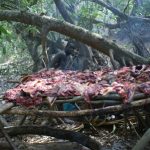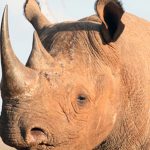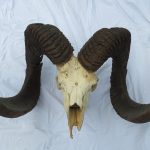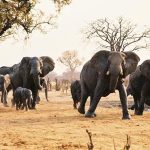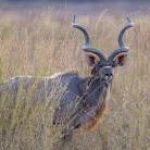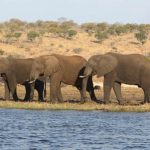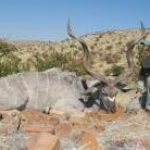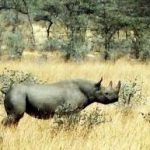DSC’s Frontline Foundation supports people injured or killed in the war against poaching.
Illegal wildlife trafficking is conservatively estimated to be worth a minimum of $10 billion per year, globally. More moderate estimates place the figure at closer to twice that amount. Either way, illegal trade in wildlife and wildlife products is, today, one of the largest black markets in the world, ranking alongside illegal drugs, weapons, and human trafficking. Every day, scores of animals, some endangered, are illegally killed by poachers, often for a single body part–a tusk or a bone–that can be illegally sold for a huge amount of money. The scale and reach of this criminal enterprise should not be underestimated or misunderstood. There are fewer and fewer lone gunmen hiding in the shadows. These have been replaced by transnational organized crime syndicates operating across international boundaries and killing animals en masse to the global detriment of wildlife, nature, and society.
The system is complex and well organized. Small-scale and regional-level syndicates manage poaching and trafficking operations on the ground and pay poachers and couriers to acquire and deliver animals and animal parts. These syndicates create and support trafficking networks, and usually also distribute weapons to poachers, as well as bribes to local law enforcement. Reports of locals being coerced into service as wildlife poachers or ivory couriers by regional syndicates, even by such extreme means as kidnapping, are not uncommon. International wildlife traffickers lead the larger enterprise; they typically support regional criminal groups, supply weapons and money, and bribe government officials. They obtain illicit wildlife products from the regional groups and smuggle them to major departure points or receive shipments from abroad and smuggle them to destination markets. The money feeds corruption at all levels. Often, it is the same group trafficking in drugs, arms, humans, and illegal wildlife.
These illegal markets are threatening many wildlife species, but consequences are especially severe in Africa, home to many of the world’s most iconic animals and host to much of the world’s organized commercial poaching. Many African wildlife populations have already been decimated, threatened with extinction or, as in the recent case of the Western Black black rRhino, wiped from the face of the Earthout. On average, three3 African rhinos are killed by poachers every day. But it is not just the charismatic mammals that fall prey to poaching and illegal trafficking. Nearly 20 tons of pangolin scales were seized from illegal shipments originating from Africa between 2013 and 2016, and in 2016, more than 5,300 kilograms of illegal ivory and rhino horn, and more than 16,000 trafficked reptiles, were seized at airports, either in passenger baggage or cargo shipments. Many species simply cannot withstand this slaughter. The lion has been extirpated from seven African countries, the total population of Grevy’s zZebra stands at just about 2,000 individuals, and fewer than 900 mountain gorillas remain in the wild; yet poaching threatens all of them.
How has this problem become so widespread and destructive in Africa and elsewhere, despite advances in international laws and policies, as well as anti-poaching technologies? Weak governance is almost always a factor and is exacerbated by regional poverty, high unemployment, and lack of state funding for wildlife management and protection activities. Currently, about 90 percent of African protected areas are unable to finance themselves and, in most cases, little government money is available to assist in anti-poaching efforts, including the employment of well-trained, well-equipped, and properly supported enforcement officers. It’s one thing to ban or limit trade in a particular species, but another to effectively enforce this, especially in countries where training and funds for enforcement are lacking. At the national and regional level, effective law enforcement to reduce and prevent poaching is now a critical need. Without effective “boots on the ground,” there can be no success in combating illegal wildlife use internationally. As President Lincoln once affirmed, laws without enforcement are just good advice. Well, dDisappearing wildlife does not need advice or even just purposeful laws; it needs action, swift and sure.
Professional hunters (P.H.s) conduct sport-hunting safaris, most often in Africa, and are typically required to accompany foreign hunters. They, like game rangers and scouts, frequently work in remote wilderness areas under dangerous conditions, usually where communication is a serious challenge and resource support is not easily accessible. Africa’s professional hunters regularly participate, often as volunteers, in anti-poaching patrols alongside game rangers and scouts, facing off against threats ranging from masked gunmen on the ground to so-called “heli-poachers,” armed with automatic weapons and firing indiscriminately from the air. The rangers, P.HH.s, and their assistants commonly choose to disregard their own personal well-being for the greater good, understanding fully that the conservation of Africa’s wildlife is meaningful to much more than their own livelihoods. These individuals make tremendous sacrifices, regularly placing their lives at risk to ensure a global heritage– – the conservation of Africa’s wildlife and protected areas.
Those on the front lines of African wildlife conservation are waging a war that is relentless and unforgiving, and that it is taking a physical and emotional toll. There are injuries and there are fatalities. Globally, the estimated number of individuals killed while engaged in anti-poaching activities has climbed past 1,000 in the last decade. That’s an average of 2of two people per week, every week, dying on the front lines of conservation. It illustrates just how devastating the losses due to poaching can be, not just to threatened wildlife populations or the success of sustainable wildlife programs, but also in terms of human fatalities and impacts on families and communities. In the event of serious injury or death of a primary breadwinner, the hardships placed on family, especially in regions where individuals are unlikely to have health insurance, life insurance, or disability coverage, can be disastrous.
In 2014, Dallas Safari Club identified this humanitarian issue as a critical need for the international hunting community to address. The Club moved swiftly and introduced the DSC Frontline Foundation, a Texas-based, non-profit organization founded in the spirit of St. Hubert, the Patron Saint of Hunters. The Foundation stands in support of those men and women who put themselves in danger, or expose themselves to significant risk, for the direct benefit of wildlife and those who value it. Since its inception, the Foundation has provided financial assistance to eligible professional hunters, guides, and outfitters (and members of their staffs) who have been seriously injured while providing professional hunting and guiding services. In 2015, its mission was expanded to encompass P.H.s and their staffs, as well as government game rangers and scouts, who are injured while participating in anti-poaching efforts.
And the DSC Frontline Foundation didn’t stop there. It also created a separate fund to assist surviving family members lies of P.H.s, game rangers, and scouts who are killed while performing anti-poaching duties, a humanitarian gesture that acknowledges our shared struggle for wildlife conservation and demonstrates a deep appreciation and respect for the victims and their families. Embodying its motto and putting words into action, the DSC Frontline Foundation truly does “Stand up for those who stand in front.”
The international hunting community owes a debt to the men, women, and families who have suffered so directly in conservation’s cause. Indeed, we all do,; whether we hunt or not. Wildlife is a legacy for all of humanity. A well-supported field force is essential if our efforts to curb poaching and conserve African wildlife is to succeed. We can’t all fight on the front lines. However, by helping support the DSC Frontline Foundation, we can stand beside those who do.
For more about the DSC Frontline Foundation and how to help, see www.dscfrontlinefoundation.org.


